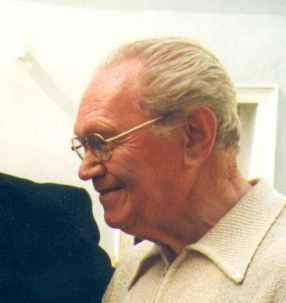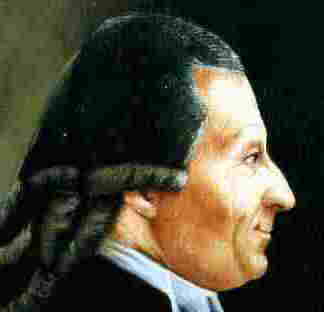


Josef Záda from Dux has died .by Marco Leeflang
.
.
Josef Zada, protector of the Casanova heritage of Dux, died on the 27th of March 2002, 79 years old.Joseph II, I used to call him. Joseph I was Polisensky, who introduced me to Zada in 1973. Casanova was the one who bound us together.
Zada has been mayor of Dux.
When the coalmining company closed in on the castle where Casanova had been librarian in the last 13 years of his life, Zada was alarmed.
Would the only worthwile remnant of the past in Dux have to disappear in the deep hole of the browncoal-eating industry?
He pleaded in courts and in politics, and won. The miners had to stop short of the castle.
Part of the parc, a pond, and a baroque hospital had already been damaged. The miners had to make partial amends by constructing a new building where the 18th century fresco's of the hospital were mounted.
And the miners continue to make amends. The fundraising for the devellopment of the city's historical museum, where the Casanova collection is kept nowadays, also benefitted of the bad conscience of the mining firm.It was the organizer Zada, together with the learned Polisensky, who arranged the first "Casanova rooms" in the castle, with a large wall-panel depicting Casanova's travels and pushbuttons by which those travels could be lit up individually.
It was Zada who made an arrangement with the daughter of Bernhard Marr (the great Casanova researcher of Dux - see the Intermédiaire des Casanovistes of 1985), that Marr's transcripts of the Casanova archive, his research papers on the local history of Dux in the 18th century, and his correspondence with the casanovists of the beginning of the 20th century didn't go astray, but were donated to the city museum.
The housing of this collection is also closely tied to Zada.
Till very recently there was no real place to store and exhibit the collection.
At first Zada kept it in two rooms of the castle; than in the former weddinghall of the city. Next he had to move it to different rooms in the local police station. But all the time Zada kept it in order and used the archive for his projects on local history and ecology.
Only in 1998 most of the collection found a resting place in the new city museum at Masarykova 7 - the meeting place for the bicentennial celebrations of 1998.Not only in the most serious matter he was a marvellous co-worker, also in more irregular operations he was cooperative. When I wanted to exhumate Casanova (that story is published in the Casanova Gleanings of 1988), I invoked Zada's help. He tried to discourage me at first, but when he realized that the easiest way to stop me, was to help me do it, he arranged that the police wouldn't bother us during the digging, that an archeologist was at hand, and that I had the necessary tools.
When I planned to computerize the complete correspondence of Casanova's heritage in Dux, he let me gradually take home all Marr's transcripts in the form of the well known large photostat volumes, or in the form of the original transparencies. They have all been returned to Dux. But it is only through his confidence that the plan could be brought to a good end.
Zada was a modest man and there was a touch of tragedy in the fact that his heart was full of warm feeling for Casanova - the only citizen of Dux who has become famous in the whole world -, but that he wasn't able to read the french and italian texts himself.
He has had every single page of the Memoirs in his hands (the photocopies lent by Brockhaus) but he could not read them, only count...
Only through translations he was able to get to know the one he had protected for so long.Zada lived most of his active life in a communist environment. But it was the postcommunist municipality that expressed its appreciation for Zada by appointing him "honorary citizen of Dux".
Photo left (by Marco Leeflang): Josef Polisensky, Tom Vitelli, and Josef Zada in Dux 1998. -. .
Photo right (by Enrico Straub): Josef Zada in Dux 1990.
Copyright by Marco Leeflang, Utrecht 2002